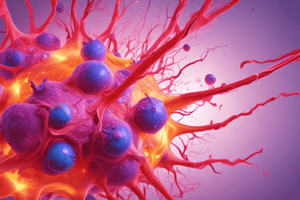Podcast
Questions and Answers
Which of the following is a characteristic of emigration during acute inflammation?
Which of the following is a characteristic of emigration during acute inflammation?
Which chemical substance is responsible for causing increased vascular permeability in acute inflammation?
Which chemical substance is responsible for causing increased vascular permeability in acute inflammation?
What causes fever in acute inflammation?
What causes fever in acute inflammation?
What is the main action of chemical mediators in the inflammatory process?
What is the main action of chemical mediators in the inflammatory process?
Signup and view all the answers
In what type of acute inflammation is pus formation more likely to occur?
In what type of acute inflammation is pus formation more likely to occur?
Signup and view all the answers
What are the cardinal signs of acute inflammation?
What are the cardinal signs of acute inflammation?
Signup and view all the answers
Which cells are the main inflammatory cells in acute inflammation?
Which cells are the main inflammatory cells in acute inflammation?
Signup and view all the answers
What is the predominant cell type in chronic inflammation?
What is the predominant cell type in chronic inflammation?
Signup and view all the answers
Which type of inflammation is characterized by vascular proliferation and scarring?
Which type of inflammation is characterized by vascular proliferation and scarring?
Signup and view all the answers
What are the major components of acute inflammation?
What are the major components of acute inflammation?
Signup and view all the answers
Study Notes
Characteristics of Acute Inflammation
- Emigration of leukocytes from blood vessels to tissues is a characteristic of emigration during acute inflammation.
Chemical Mediators of Acute Inflammation
- Increased vascular permeability in acute inflammation is caused by histamine, a chemical substance.
Causes of Fever in Acute Inflammation
- Fever in acute inflammation is caused by pyrogens, such as interleukin-1 (IL-1) and tumor necrosis factor-alpha (TNF-alpha).
Action of Chemical Mediators
- Chemical mediators, such as histamine and bradykinin, increase blood flow, permeability, and pain in the inflammatory process.
Type of Acute Inflammation with Pus Formation
- Suppurative inflammation is the type of acute inflammation where pus formation is more likely to occur.
Cardinal Signs of Acute Inflammation
- The cardinal signs of acute inflammation are rubor (redness), dolor (pain), calor (heat), and tumor (swelling).
Main Inflammatory Cells in Acute Inflammation
- Neutrophils are the main inflammatory cells in acute inflammation.
Predominant Cell Type in Chronic Inflammation
- Macrophages are the predominant cell type in chronic inflammation.
Characteristics of Chronic Inflammation
- Chronic inflammation is characterized by vascular proliferation and scarring.
Major Components of Acute Inflammation
- The major components of acute inflammation are vasodilation, increased permeability, and leukocyte emigration.
Studying That Suits You
Use AI to generate personalized quizzes and flashcards to suit your learning preferences.
Description
Learn about the complex reaction of tissue and microcirculation to a pathogenic insult, characterized by the generation of inflammatory mediators and movement of fluid & leukocytes from the blood into extra vascular tissues. This lecture covers the definition and types of acute inflammation.




